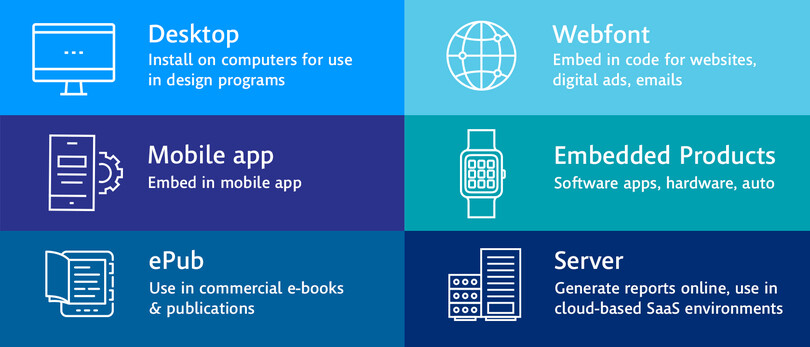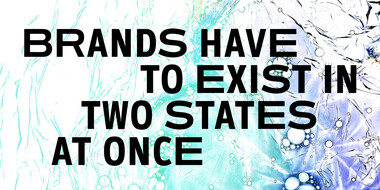Font licensing 101: The basics of font usage for brands and creatives.

Fonts and font licensing have long been difficult to coordinate. IT and procurement teams want visibility into what is being licensed, how fonts are used, and where they are deployed, while designers and creatives just want to focus on their work and use the best font for each project.
Simplifying the way you access, license and deploy fonts allows your brand to be agile and adaptable, to roll out new designs quickly, and to grow with your customers. We live and breathe fonts, which means we can help you overcome these challenges and make the most of the opportunities a better approach to fonts can offer.
Questions about your brand's existing font licenses?
Sometimes companies, especially large ones, lose track of exactly which fonts are licensed for what. Sometimes a font in use won’t have a license at all. And sometimes someone thinks they’re using the correct font, but …
If have questions or concerns about licensing at your company, don’t worry—we can help. Get in touch today and we’ll answer any questions you have about font licensing in general or your organization’s licensing in particular, and help you figure out the best way forward.
Looking for a better font solution?
Mosaic is our all-in-one solution for font discovery, expertise, collaboration and management. With Mosaic, you can free your creative teams to discover, share and prototype limitlessly with fonts – while making it easier to license, deploy, and manage usage of all your fonts across enterprise.
Font licensing FAQs
Font licenses can appear overwhelming in their complexity. But in reality, font licenses are fairly straightforward as long as you understand their individual parts.
What is a font license?
A font license is simply an agreement that gives you permission to use a font, subject to the terms of that agreement (also called an End User License Agreement or “EULA”).
Are fonts intellectual property?
Yes. Like art, music, or literary works, fonts are designed by real people and are protected by certain intellectual property rights. Beyond the design itself, fonts are software, engineered with features and flexibility that enable good design and usability.
Do I need separate licenses for different uses?
Yes. There are a few basic license types offered by Monotype, each pertaining to a different form of usage. Desktop licenses allow you to install a font on a computer; webfont licenses allow you to embed the font into a website or email; embedded licenses let you distribute fonts in physical products like medical devices, cars, or in software programs; mobile app licenses allow fonts to be embedded in phone/tablet apps; ePub licenses cover usage in commercial publications; and server licenses enable web or cloud-based services and SaaS use cases.

Most font licenses fall into one of these general categories. We can help you decide which ones you need and make sure you understand the specific guidelines of each.
Can I use a font with a desktop license on my website?
No. A typical desktop license allows you to install the font on your computer for use in design programs like InDesign. Webfont licenses allow you to embed that font in the code for a website or email. So, whereas you might use a desktop license to create a static image (like a .jpeg) you upload to your website, a webfont license facilitates the implementation of the font in the actual code of your website.
Once I license a font, can I share it with as many people as I want?
Not exactly. Most EULAs limit the number of “seats” or “workstations” that are allowed, aka the number of times it can be shared. If you need to share a font widely (for example if you have a huge creative team) you can include that in your initial license agreement. You can also purchase additional licenses to add seats or workstations if your needs change.
Quick note from the Monotype legal department: The information included here pertains to Monotype font licenses only. Other foundries may have unique requirements or restrictions in their contracts. Always read your licensing agreements closely.

